The top U.S. Air Force commander for the Middle East, Lt. Gen. Alexus Grynkewich, stated that Houthi rebels in Yemen may be running low on supplies of drone swarms and anti-ship ballistic missiles, leading to a slowdown in their attacks. The Houthis have been targeting commercial and military ships in the Red Sea and Gulf of Aden, disrupting a crucial shipping route. The U.S. and its allies have increased their military presence in the region in response to these attacks and have been conducting retaliatory strikes on Houthi ammunition and facilities.
Grynkewich mentioned that it is challenging to assess the extent of damage to the Houthis’ weapons supplies due to a lack of intelligence on their capabilities before the U.S. strikes began. He highlighted the importance of understanding the initial denominators of the weapons to determine the impact of the strikes. Additionally, the role of Iranian resupply to the group is crucial in assessing their abilities. The U.S. believes the Houthis had numerous anti-ship ballistic missiles initially, and monitoring Iran’s restocking efforts is key.
The Houthis claim their attacks are aimed at pressuring Israel to end its conflict with Hamas in Gaza, although the targeted ships have minimal or no connection to Israel or other involved nations. Grynkewich stated that the Houthis operate independently and are less controllable by Iran compared to other Tehran-backed militias in Iraq and Syria. While these groups have paused their attacks on U.S. forces since February, the Houthis remain active. Grynkewich expressed doubts about Iran’s ability to instantly influence the Houthis even if they tried to withhold support or weapons.
Despite pressure from Iran, Grynkewich mentioned that the Houthis are not as responsive to Iranian direction, making them a unique challenge in the region. He highlighted that cutting off weapons or supplies to the group would require time to have an effect on their operations. The U.S. has been actively engaging in airstrikes against Houthi drones and missiles to prevent future attacks on ships in the area. Grynkewich emphasized the need to continue monitoring the situation and adapting tactics to counter the evolving threats posed by the Houthi rebels in Yemen.


